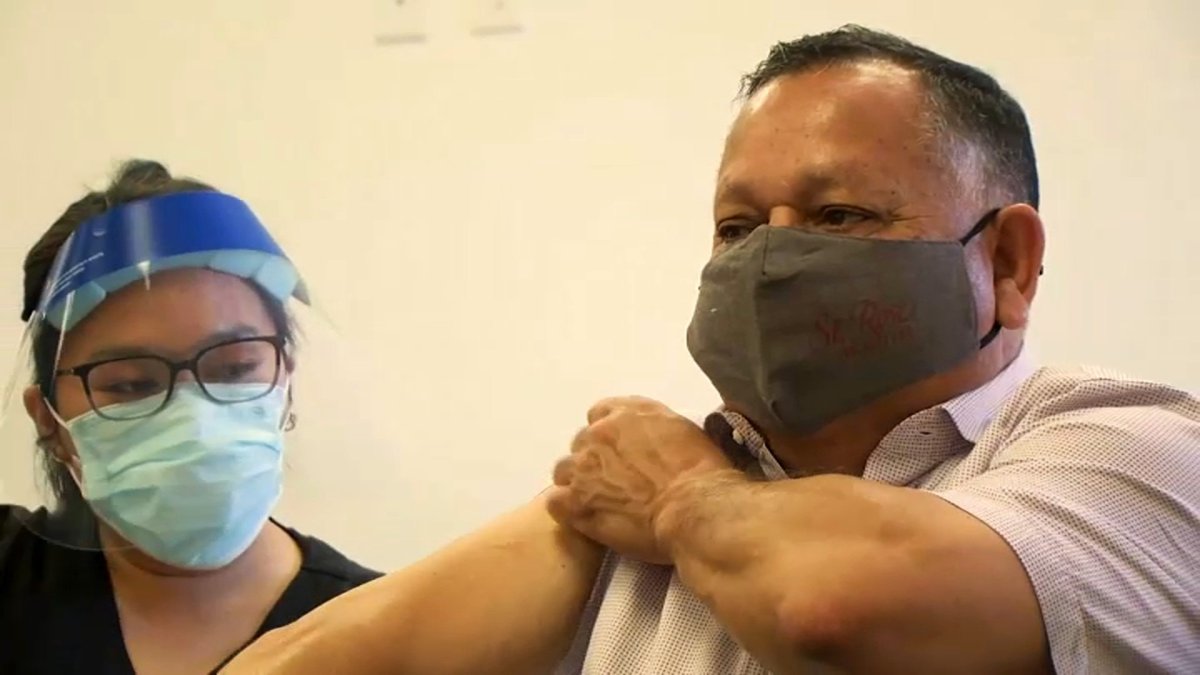
Among the paramedics, firefighters and other first responders lined up to receive the COVID-19 vaccine last Friday at Hayward’s St. Rose Hospital, was one person whom you likely wouldn’t expect to see, according to state guidelines governing vaccine distribution. NBC Bay Area Investigative Reporter Stephen Stock has the story.
Among the paramedics, firefighters and other first responders lined up to receive the COVID-19 vaccine last Friday at Hayward’s St. Rose Hospital, was one person whom you likely wouldn’t expect to see, according to state guidelines governing vaccine distribution.
NBC Bay Area crews covering the event spotted St. Rose Hospital board member Fred Naranjo getting a shot, who is not a medical worker, but the owner of a San Francisco-based insurance company.
State guidelines are clear about who should be receiving the vaccine in Phase 1A: Front-line medical staff, skilled nursing and assisted living facilities, and first responders providing emergency medical services.
Under CDC guidance, the state and each county determined who would be at the front of the line for the limited initial run of Pfizer vaccines. The goal is to vaccinate those who risk exposure to the virus nearly every day.
When asked by NBC Bay Area’s Investigative Unit about this seeming disparity, Fred Naranjo declined an on-camera interview. But in a phone interview, he defended the decision to take the shot along with medical staff and first responders.
“I haven’t jumped the line,” Naranjo said. “I’m at the hospital all the time walking the halls, talking to people.”
Naranjo, who is Hispanic, said he wanted to demonstrate to the Hispanic community that the vaccine is safe.
Local
“The main thing I wanted to do is to show people to take the vaccine and not to be afraid,” Naranjo said. “That it is safe. They need to be protected.”
“I’m Hispanic. I want my community to know this (vaccine) is available to everyone. They, regardless of their immigration status, can trust us.” he said.
According to data provided by St. Rose, the hospital oversaw the distribution of 2,000 separate vaccine shots. Of those 2,000 shots, the hospital said 35% went to hospital staff, such as nurses and doctors, and 65% went to county emergency workers. Just one went to a board member, Naranjo, the hospital said.
A spokesperson for the hospital said its administration made a conscious decision to include Naranjo in the first round of shots because “he’s been a leader promoting the safety and the efficacy of this vaccine.”
A spokesperson for the Alameda County Health Department said in a statement it was the hospital’s duty to determine who among their staff would get the vaccine.
“St. Rose is responsible for tracking the staff who reported for vaccinations. The doses allocated to St. Rose Hospital covered everyone they identified for this initial phase of vaccination without requiring additional prioritization.”
There are more than 2 million healthcare workers in California, and not nearly enough doses of the vaccine to go around in the first wave.
Last week, Stanford Medical School residents were outraged after learning some faculty who had little-to-no contact with the public got vaccinated ahead of others who handled patients.
Stanford admitted that the algorithm it used to determine which of their staff got the vaccine “got it wrong” and apologized for the error.
“The data that they put in had the risk for older people being greater than the risk for younger people, but they didn’t make it more specific than that,” said Dr. Christine Cassel, Senior Advisor for Strategy and Policy and a bioethicist at UCSF’s Department of Medicine.
“So, all the department chairs and the deans and the people running the place are older and the residents who are taking care of the patients are all younger people.”
Dr. Cassel said regardless of motive, hospital board members taking the shot ahead of front-line medical workers doesn’t build trust among the public.
“I will say it exactly sends the wrong message,” Dr. Cassel said.
Cassell said these debates about how we allocate the vaccine is ultimately a good thing.
“I think it’s a very healthy thing for the society that we’ve begun to talk openly about rationing and begun to examine those value,” Cassel said.